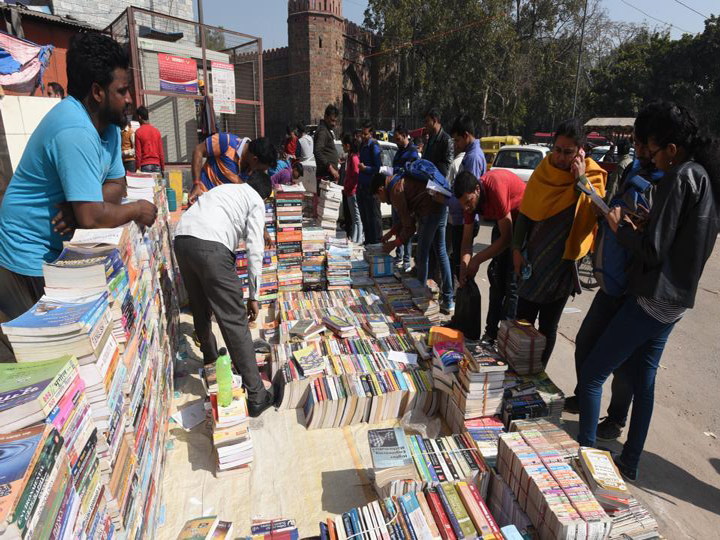Kejriwal has claimed Delhi to be the first to apply the Street Vendors Act 2014. In September 2018, the Delhi government had formed 27 provisional Town Vending Committees (TVCs), as directed by the Supreme Court. Unfortunately, of the 27, meeting minutes and notices are available for only 8 TVCs. A TVC is responsible for conducting vendor enumeration and issuing identity cards and certificates of vending.

Living with constant eviction threats and insecurity, the street vendors of Delhi were finally acknowledged by its Chief Minister Arvind Kejriwal. He highlighted the vendors’ plight of being ‘extorted…forced to give bribes and pushed around’.
Kejriwal has claimed Delhi to be the first to apply the Street Vendors Act 2014. In September 2018, the Delhi government had formed 27 provisional Town Vending Committees (TVCs), as directed by the Supreme Court. Unfortunately, of the 27, meeting minutes and notices are available for only 8 TVCs. A TVC is responsible for conducting vendor enumeration and issuing identity cards and certificates of vending. A year later today, Kejriwal declares that they have set up 28 TVCs that will survey vendors within 30 days, post which they will receive certificates of vending and official ID cards.
Currently, a hub of arbitrary urban infrastructural practices, Delhi’s street vendors are still struggling to find their place amidst the Smart Cities mission and pedestrianization projects. One such case is of the Daryaganj Sunday Book Bazaar.
After two months of shutters down and negotiations with North Delhi Municipal Corporation (No DMC), the popular weekly bazaar finally reopened at Mahila Haat near Asaf Ali Road. Until now, every Sunday morning, the Sunday Book Bazaar of 276 vendors turned Netaji Subhash Marg, from Delite cinema to Golcha Cinema, into one big book fair.p>
An essential part of the cultural fabric of Delhi, this citizens’ bazaar is an important source of books for all income groups, for people coming from all over the world. Even the Delhi High Court, in a 2007 judgment, acknowledged the significance of weekly markets for books: ‘…weekly markets for sale of books is a suggestion worth considering, particularly in view of the fact that the readership of books is diminishing day by day on account of rising costs of books which many cannot afford’.
The same Delhi High Court on 3 July 2019, however, changed its view and directed NoDMC to shut down weekly bazaars on Netaji Subhash Marg, explicitly declaring it as a no-hawking zone. This order was based on an inspection report submitted by the Traffic Police to NoDMC, opposing the running of the Saptahik Bazar (Kabari Bazaar) in this area, highlighting that “if weekly Bazaar is allowed to continue on Netaji Subhash Marg… it will hinder the smooth flow of traffic…” While this court order was filed for a suitable relocation of the Saptahik Bazaar, the Sunday Book Bazaar found itself caught in the middle, as it also operated in the same area.
Unfortunately, this is not the first time when the Sunday Book Bazaar has faced the threat of permanent closure. On 24 December 2017, the market remained shut for five weeks for security reasons, amidst preparations for the ASEAN Summit and Republic Day. When reopened, the vendors were asked to readjust within a shorter perimeter. All this, even though these vendors are registered under the Daryaganj Patri Sunday Book Bazaar Welfare Association and have been paying a fee to NoDMC for tehbazari (hawking license) since 2011. Proven by a Right to Information (RTI) filed by the vendors to NoDMC, the Book Bazaar is permitted to operate from Delite to Golcha cinema. After all, how much problem could a market hold once a week cause?
In September 2018, the Daryaganj Patri Sunday Book Bazaar Welfare Association approached the High Court of Delhi only to be disappointed with their petition disposed of. The order asked the petitioners to ‘approach the TVC as and when it is functional’. Jahanvi Worah, the advocate for the vendor petitioners, pointed out that there is still no operational TVC in the zone. Qamar Saeed, President, Sunday Book Bazaar Welfare Association, questions, that by the time a TVC is created, the vendors would scatter and relocate; then “who will they survey if no vendors are sitting there?” Moreover, vendors have requested the Court to elevate the Book Bazaar to heritage status. The Second Schedule of the Act provides that natural markets, where vendors have conducted business for over fifty years, should be declared as heritage markets and the vendors should not be relocated.
The vendors desire legality and are willing to relocate with the assurance of proper licenses. After continued negotiations, the vendors finally agreed to relocate to Mahila Haat. The vendors have requested for ID cards and have been promised ‘proper paperwork’ by the authorities.
The Street Vendors Act provides for every practice and penalty of the vendor it aims to protect, including no eviction without a survey and declaring fifty-year-old bazaars as heritage markets. But, there are no provisions to check the arbitrary decision-making of the local administration or judiciary. The order made by the High Court of Delhi on Sunday Book Bazaar neglects the statute and prioritizes the competing interests of pedestrians over vendors. The local administration’s intent to ensure better traffic flow and the safety of citizens is well-founded. However, does it mean that it has to happen at the cost of vendors’ livelihood? Should the fundamental rights of one be safeguarded at the cost of another?
Being one of the first city leaders to acknowledge the street vendors explicitly, the jury is still out on how the current Chief Minister plans to integrate all institutions to fulfill his promises to the vendors.

